If it ain’t broke, don’t fix it, the tired old cliche goes.
Cliches are cliches because they’re boring and overused. And they’re overused because they tend to be true.
With the New York Rangers’ season set to start Oct. 12 against the Buffalo Sabres, they’re about to find out just how much this adage applies to them when it comes to their backup goaltending situation – and the offseason decision to go in a different direction from what worked in 2022-23.
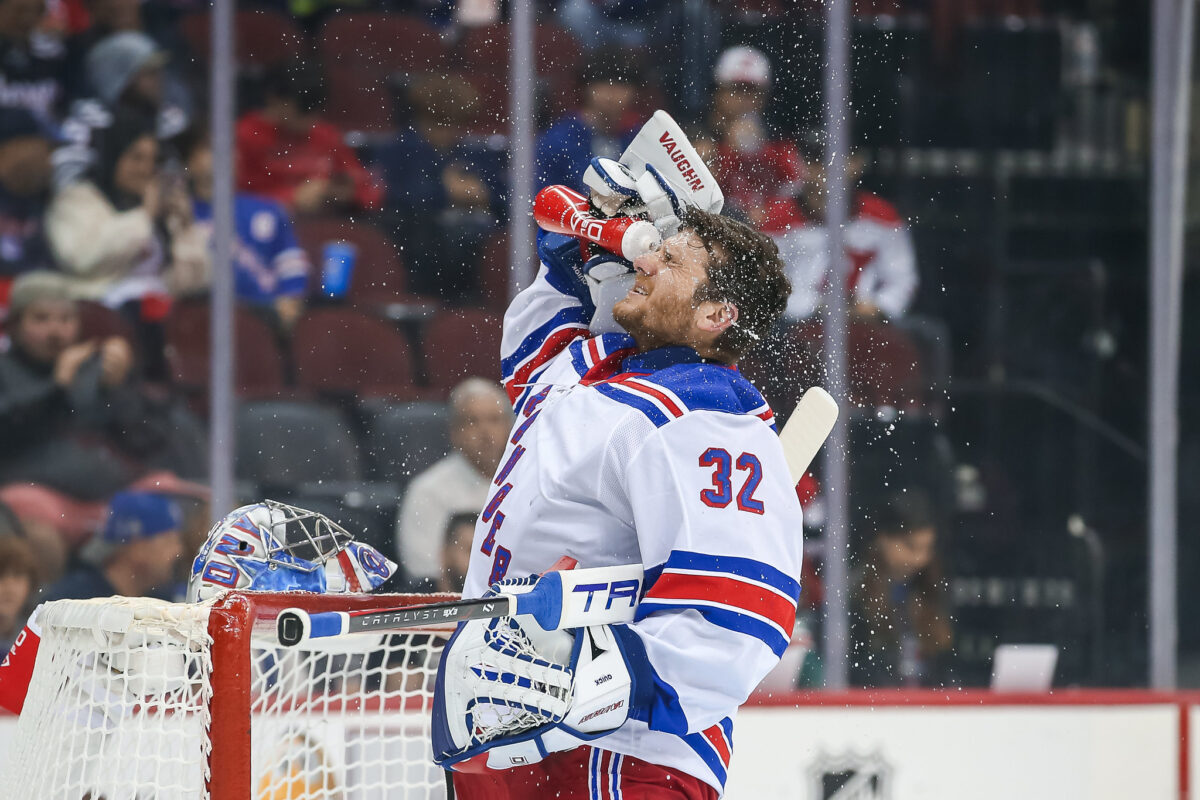
It’s likely that few signings of a No. 2 netminder have garnered as much attention as the Rangers’ inking of future Hall of Famer Jonathan Quick, the local kid who’s nine years removed from playing a major role in denying the Blueshirts a Stanley Cup. The July 1 addition of the Milford, Conn., native on a one-year, $925,000 contract brought the 37-year-old full circle, returning the childhood Rangers fan to his roots and close to his hometown.
Quick was the Blueshirts’ nemesis not long ago, backstopping his Los Angeles Kings to a five-game victory over the Rangers in the 2014 Stanley Cup Final, a series in which he allowed two or fewer goals in four of those games en route to his second championship. With 375 career wins, a .911 save percentage, 2.47 goals-against average and 58 shutouts, his spot in the Hall is all but assured.
Quick’s Preseason Resembled His Disappointing Vegas Tenure
Though Quick’s eager signing with the Blueshirts makes for an interesting story, there’s a potential problem with it that looks ready to present itself: The Quick who beat the Rangers in the Cup Final, and the one that compiled those gaudy regular-season numbers, might be long gone.
Supplanted by Pheonix Copley as the Kings’ No. 1 goalie at midseason in 2022-23, Los Angeles traded the franchise icon to the Columbus Blue Jackets on March 1, only to be flipped to the Vegas Golden Knights one day later. Though the Knights went on to win the Cup, giving Quick his third championship ring, that story was mostly a dud: Quick posted a 3.13 GAA in 10 regular-season games with Vegas and didn’t play in the playoffs. His 3.41 GAA for the season marked the first time he posted a GAA over 3.00 in four seasons.
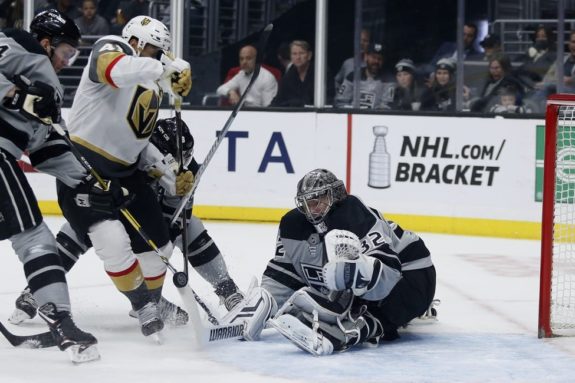
It’s not known if general manager Chris Drury, whose hometown of Trumbull, Conn., is about 10 miles away from Milford, believed a return to the Northeast would spark a late-career rejuvenation for Quick – or if that factored into the decision to sign him at all. What is certain is that this preseason did nothing to dispel the notion that Quick’s days as an effective NHL goalie are, well, quickly coming to a close.
In his three exhibition games, Quick recorded an .807 save percentage and 5.07 GAA, outings that amounted to two games’ worth of minutes. The Rangers didn’t play terribly well in front of him, but that was also the case with Igor Shesterkin, Dylan Garand and Louis Domingue during the preseason, and all three posted GAAs below 2.00.
Related: Rangers’ Prospects Othmann & Garand Can Contribute in 2023-24
At his best, Quick did what elite goalies do: Act as an eraser for teammates’ defensive mistakes. He hasn’t shown much over the past season-plus to convince anyone that he’s still capable of it. On a Rangers team that few would confuse with a top-flight defensive outfit and which relies heavily on its netminders’ abilities to clean up the mess, having an ineffective No. 2 goalie could prove to be a major problem for a club that fancies itself a Stanley Cup contender.
“I think the way the year finished up, my role with Vegas, there were times when there were injuries and I was the No. 1 guy and then when guys were healthy, I wasn’t,” Quick said earlier this preseason. “So what I did realize and what I tried to be great at was recognizing the importance of having that backup goalie that goes out early, stays out late and being there for my teammates’ needs.
“It’s about what the team needs.” (From ‘Jonathan Quick’s Rangers Challenge Won’t Be Like Anything He’s Done Before’, New York Post, 9/22/23)
It didn’t have to be this way, of course.
Whatever the motivation, Drury wasted little time in choosing his backup even before July 1, with it being correctly reported that Quick was all but a lock to join the Rangers when free agency officially opened. What was puzzling about the haste in enlisting Quick was that fact that the Rangers’ backup last season performed the role to a “T.”
Jaroslav Halak signed with the Blueshirts for one year at $1.5 million on July 13, 2022, replacing Alexandar Georgiev, who became too expensive to be a backup and was traded to the Colorado Avalanche. Halak, then 37, got off to a 1-6-1 start in 2022-23, posting a 3.04 GAA and .888 save percentage that prompted some of the same worries the club is facing now.
Halak, though, followed that up with a seven-game winning streak, allowing one goal three times and two goals once in that span. The 17-year veteran with the proven track record emerged as exactly what the Blueshirts hoped he would be – a trusted, steady option who could step in for Shesterkin on a rest-game basis, or even long-term, should the need arise. Halak delivered 25 points for the Rangers, finishing with 10-9-5 record, 2.72 GAA and .903 save percentage – numbers skewed by his poor start.
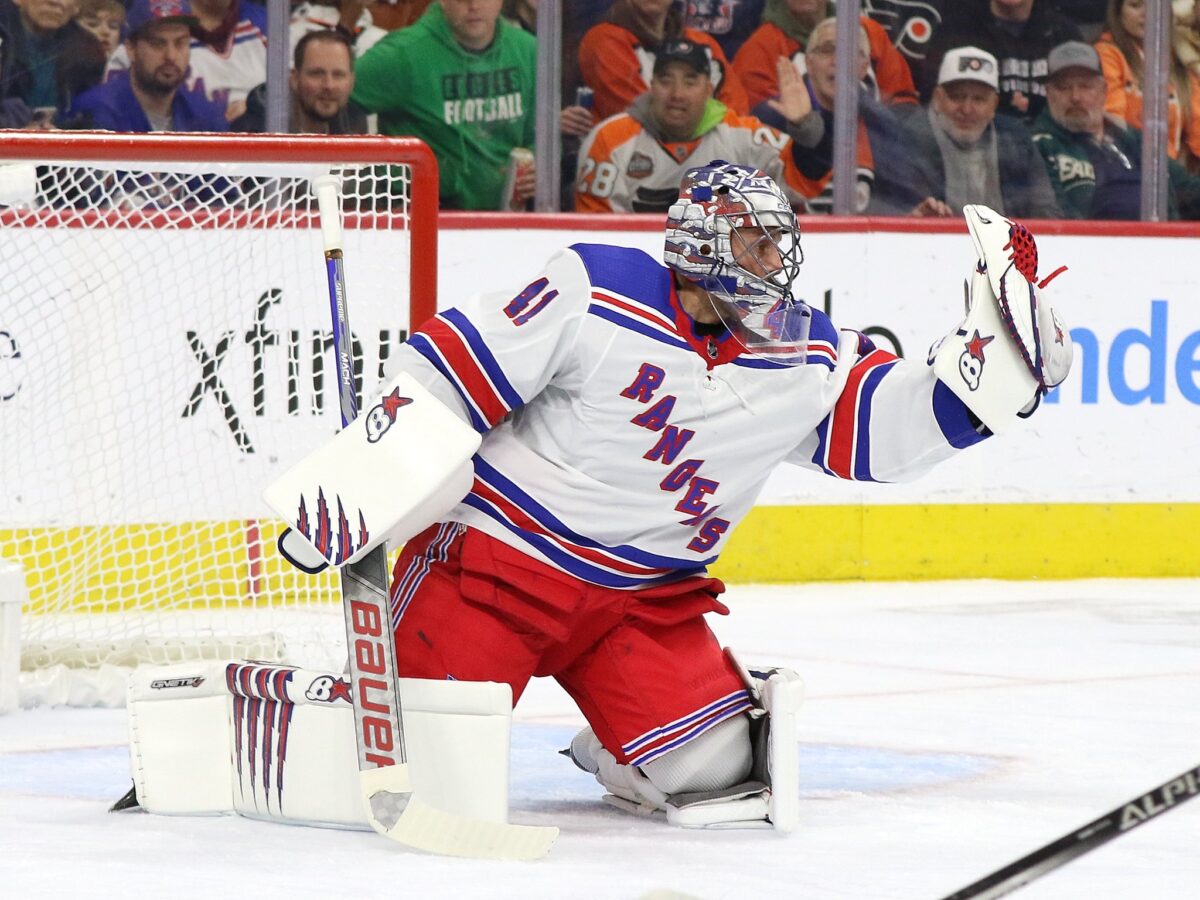
Halak had spent years as a backup, having adapted to the realities of what he had to do to remain in the NHL. Can Quick, the unquestioned No. 1 for his team for 15 years before having the No. 2 spot thrust upon him last season, make the transition?
Rangers Have Benefited From Capable Backup Goalies Recently
Perhaps patience is required. Halak looked like a bad pickup for the first month and a half of last season before emerging as a trusted option behind Shesterkin. Quick, who endured a trying, emotional rollercoaster of a season in 2022-23, might need time to settle into his new role.
This preseason, however, didn’t evoke any confidence that last season was an aberration and not an advancing trend. The Rangers have avoided overworking Shesterkin in his two full seasons as the undisputed No. 1, trying to keep him fresh for the playoffs and being mindful of the two groin injuries which felled him for a time in his first and second years. Shesterkin played in only 111 regular-season games over the past two seasons, and the Rangers were rewarded with health and a Vezina Trophy-winning performance in 2021-22.
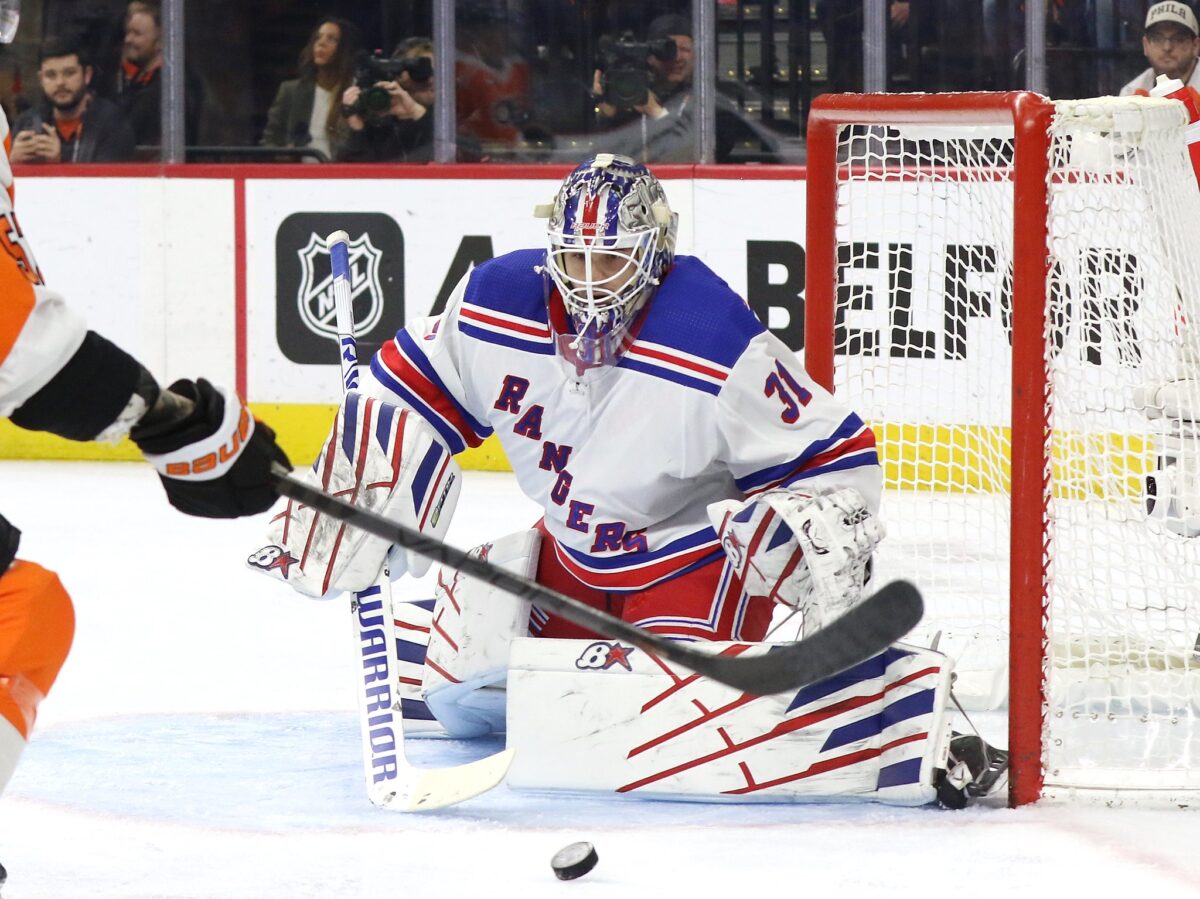
The Blueshirts haven’t just benefited from the luxury of great No. 1 goalies for most of the past of the past 40 years or so – their fortification of the backup spot has made a difference recently. Cam Talbot stepped in for Henrik Lundqvist in 2014-15 when Lundqvist suffered a neck injury that kept him out for 26 games. Talbot started 24 of those and went 17-4-3, finishing the season with a 21-9-4 mark and 2.21 GAA. The Rangers won the Presidents’ Trophy with 113 points.
Next up, it was Antti Raanta, who in 55 games as Lundqvist’s backup went 27-14-4 with a 2.25 GAA from 2015-17. Georgiev followed, and though he struggled with the No. 2 role at times, the team had plenty of confidence that he could handle the No. 1 spot on an extended basis if need be.
The club was certainly comfortable with Halak taking over if Shesterkin had suffered another injury last season. It would be impossible for them to confidently say the same about Quick at this point. At best, the 2012 Conn Smythe Trophy winner is an unknown. At worst, he’s a great player in decline and unable to figure out how to handle the backup job.
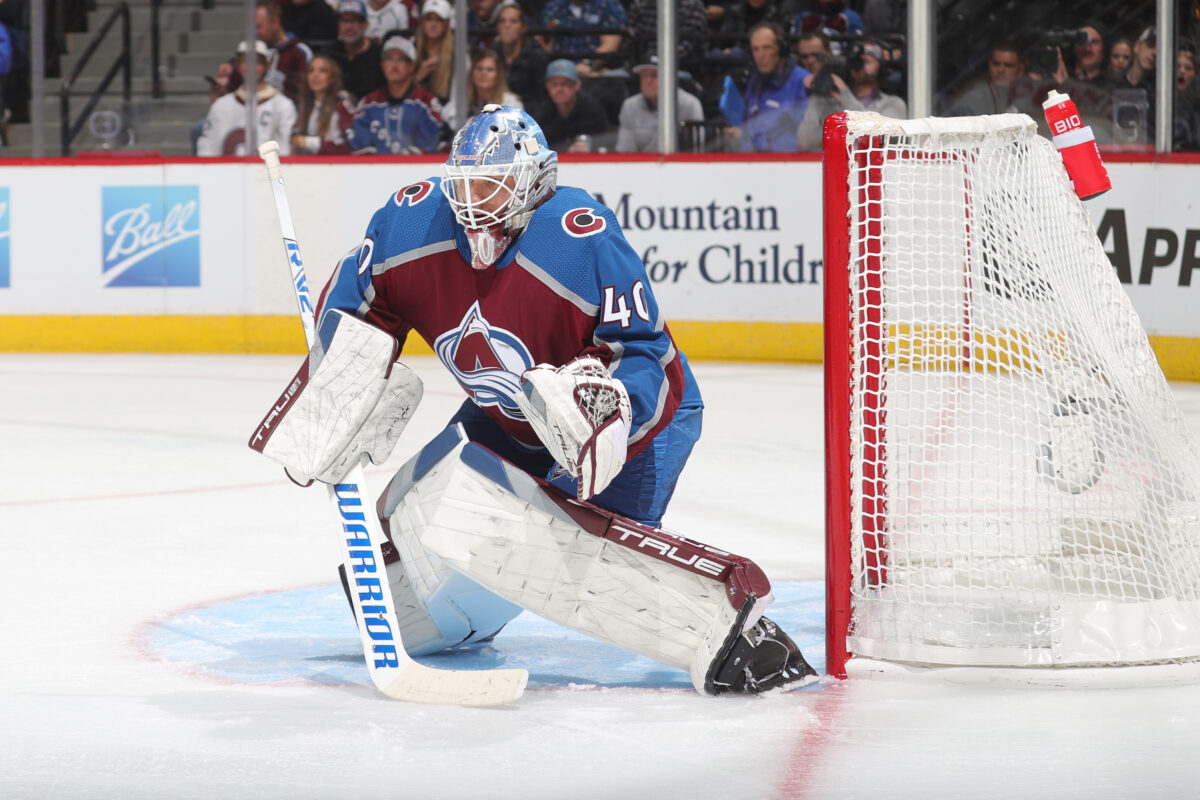
The switch to Quick seemed pointless and even dismissive of what Halak did last season. Drury’s reasoning may have been cost; with a very tight salary-cap situation, he moved fast to add bargain-bin, bottom-of-the-lineup skaters on the first day of free agency. The GM wasn’t going to be able to bring Halak back for $1.5 million in 2023-24.
Rangers GM Drury Didn’t Need to Rush Into Quick Signing
Veteran backup goalies, though, aren’t hot commodities, regardless of their underrated importance. Halak remains unsigned, reportedly interested in continuing to play, and it stands to reason he would have re-upped for a salary the same as or lower than Quick’s after the initial run on free agents slowed to a crawl. There seems to have been little reason for Drury to jump to ink a 37-year-old No. 2 goalie who was coming off a worrisome season. Veteran netminders tend to be available past Day 1 of free agency, and for obviously low prices.
The Rangers won’t know whether Quick can revert to a semblance of his dominant form until he makes some starts this season. If he doesn’t, the alternatives aren’t great. Garand, a well-regarded prospect, impressed in the preseason, but he’s 21 and his development would be best served via extensive playing time in Hartford of the American Hockey League. Domingue had the strong preseason and has played in 142 regular-season games, but he’s a journeyman who was signed to provide depth at Hartford and an emergency option at the NHL level.
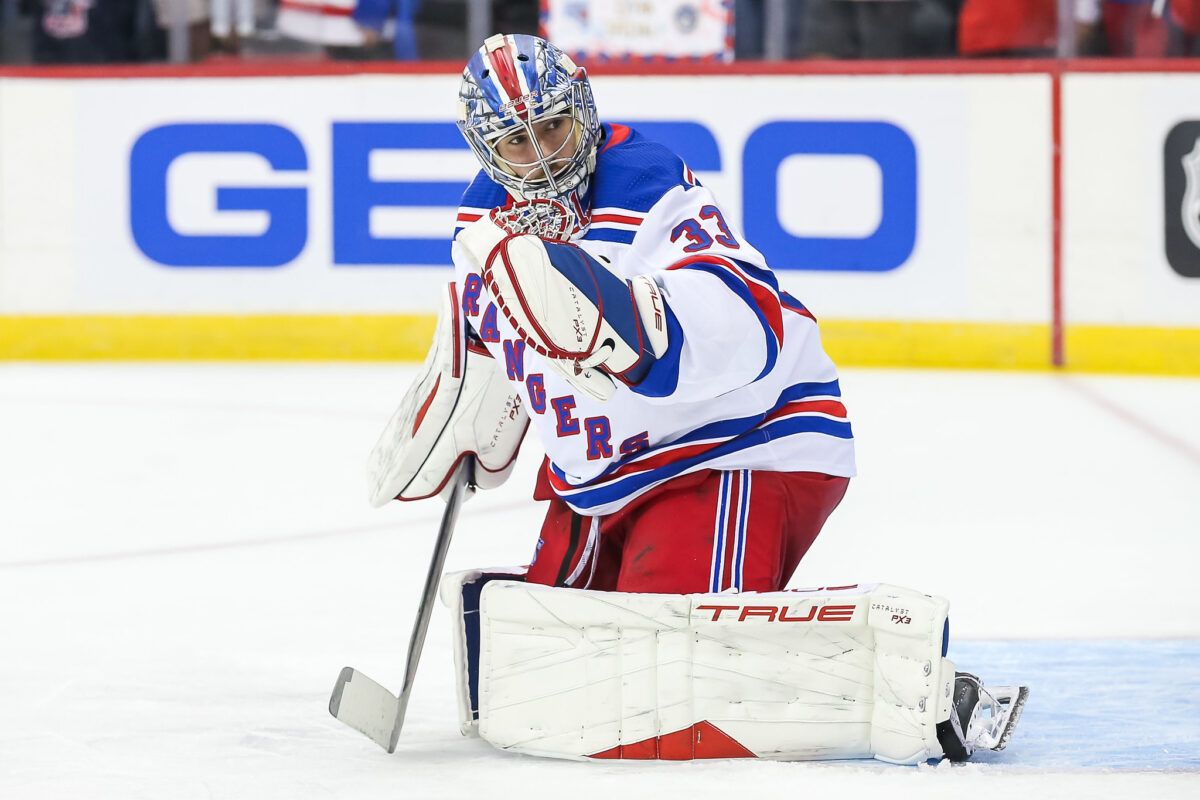
The addition of Quick felt flashy, the kind of big-name move the Rangers and other New York City teams have always gravitated toward. Drury had better hope that it is more. Halak wasn’t a headliner, but he got his overlooked job done perfectly. At this point, the Blueshirts are another Shesterkin muscle pull away from an unknown situation in net – one that could easily derail their season if their star No. 1 netminder is down for any significant length of time.
